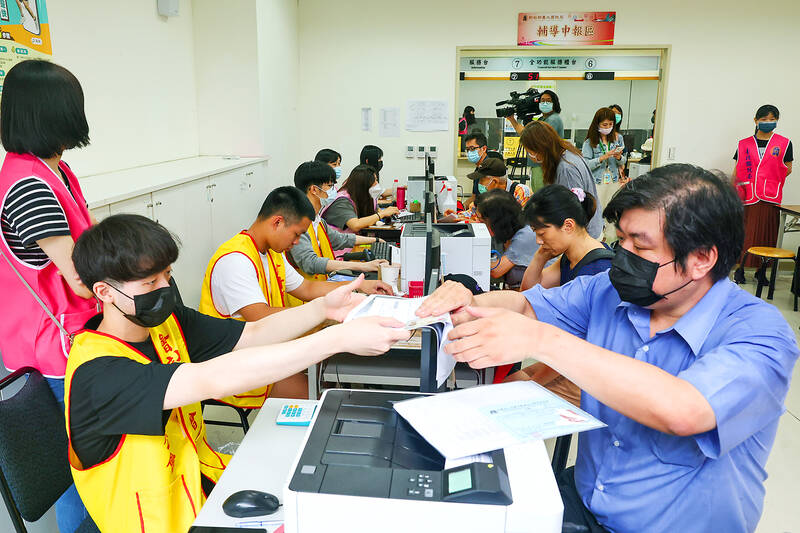Tax revenue last month more than doubled year-on-year to NT$621.7 billion (US$20.23 billion), as the COVID-19 pandemic-fueled moratorium for income tax declarations last year lowered the comparison base, the Ministry of Finance said on Friday.
The national treasury received a boost from an artificial intelligence (AI) fever that allowed securities transaction tax revenue to return to growth territory for the first time in nearly two years.
Corporate income tax revenue surged 12.8 times from a year earlier to NT$319.3 billion, while personal income tax revenue advanced 74.1 percent to NT$59.1 billion, the ministry said, attributing the bumps to different timings for annual income tax declarations.

Photo: CNA
The ministry last year extended the deadline for tax filing by one month to June, as spiking COVID-19 infections disrupted people’s daily activities, which led to poor showings for May last year, statistics official Liang Kuan-shuan (梁冠璇) said.
Securities transaction tax revenue grew 10.9 percent to NT$15.9 billion, ending 16 straight months of declines after daily stock market turnover expanded 9 percent to NT$309.9 billion last month, the ministry said.
The data reflect an improvement in investment interest, Liang said, adding that the momentum was evident this month when daily turnover reached NT$337.4 billion.
The improvement came after Nvidia Corp, the world’s biggest AI graphics chip supplier, posted strong earnings guidance for this quarter and beyond.
The recent visit of the company’s chief executive officer Jensen Huang (黃仁勳) to the Computex trade show in Taipei supported the frenzy, as Taiwanese electronics companies are part of Nvidia’s global supply chains.
“The state coffers benefited from the AI fever judging by the daily stock turnover, but it remains to be seen whether the uptrend can be sustained,” Liang said, adding that the recent daily trading volume beat the ministry’s forecast for this year.
Revenue from the land value incremental tax, a gauge of the property market’s health, fell 27.9 percent from a year earlier to NT$6.2 billion after the number of taxable cases decreased 7.8 percent to 51,942, the ministry said.
Last month’s fall in land value incremental tax revenue moderated from a drop of 34.5 percent in April, the ministry said.
Although the annual decline in revenue from the integrated house and land transaction income tax tapered off to 6.5 percent last month from a fall of 27.6 percent in April, it is too early to speculate on a recovery in the local real-estate market as the macro-environment remains unfavorable, Laing said.
The nation posted total tax revenue of NT$1.24 trillion in the first five months of the year, up 36 percent from the same period last year, the ministry said.
The figure from January to last month was ahead of the ministry’s budget schedule by 45.3 percent, it said.

Nvidia Corp chief executive officer Jensen Huang (黃仁勳) on Monday introduced the company’s latest supercomputer platform, featuring six new chips made by Taiwan Semiconductor Manufacturing Co (TSMC, 台積電), saying that it is now “in full production.” “If Vera Rubin is going to be in time for this year, it must be in production by now, and so, today I can tell you that Vera Rubin is in full production,” Huang said during his keynote speech at CES in Las Vegas. The rollout of six concurrent chips for Vera Rubin — the company’s next-generation artificial intelligence (AI) computing platform — marks a strategic

Enhanced tax credits that have helped reduce the cost of health insurance for the vast majority of US Affordable Care Act enrollees expired on Jan.1, cementing higher health costs for millions of Americans at the start of the new year. Democrats forced a 43-day US government shutdown over the issue. Moderate Republicans called for a solution to save their political aspirations this year. US President Donald Trump floated a way out, only to back off after conservative backlash. In the end, no one’s efforts were enough to save the subsidies before their expiration date. A US House of Representatives vote

REVENUE PERFORMANCE: Cloud and network products, and electronic components saw strong increases, while smart consumer electronics and computing products fell Hon Hai Precision Industry Co (鴻海精密) yesterday posted 26.51 percent quarterly growth in revenue for last quarter to NT$2.6 trillion (US$82.44 billion), the strongest on record for the period and above expectations, but the company forecast a slight revenue dip this quarter due to seasonal factors. On an annual basis, revenue last quarter grew 22.07 percent, the company said. Analysts on average estimated about NT$2.4 trillion increase. Hon Hai, which assembles servers for Nvidia Corp and iPhones for Apple Inc, is expanding its capacity in the US, adding artificial intelligence (AI) server production in Wisconsin and Texas, where it operates established campuses. This

US President Donald Trump on Friday blocked US photonics firm HieFo Corp’s US$3 million acquisition of assets in New Jersey-based aerospace and defense specialist Emcore Corp, citing national security and China-related concerns. In an order released by the White House, Trump said HieFo was “controlled by a citizen of the People’s Republic of China” and that its 2024 acquisition of Emcore’s businesses led the US president to believe that it might “take action that threatens to impair the national security of the United States.” The order did not name the person or detail Trump’s concerns. “The Transaction is hereby prohibited,”